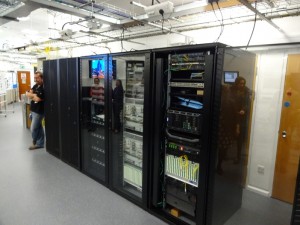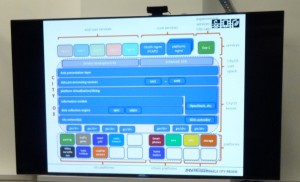Bristol to be world’s first programmable smart city
The Bristol is Open programme is aiming to be the world’s first programmable city by opening up a scalable software defined network (SDN) operating system to researchers and companies.
The netOS operating system developed by the High Performance Computing group at the University of Bristol runs on the BlueCrystal supercomputer at the University and controls a network of 144 fibres across the city of Bristol, giving terabit/s of bandwidth. The key to the programme is that the network can be divided up into separate virtual ‘slices’ so that many applications can all run independently. This will allow individual applications from 100Mbit/s up to 100Gbit/s to be tested out, something which hasn’t been possible up until now, says Prof Dimitira Simeonidou, head of the research group and chief technology officer of Bristol is Open. All of this is combined into the CityOS and makes it fundamentally different to other smart cities such as Barcelona.
The network currently has four nodes connecting the University, the EngineShed business acceleration centre, the Watershed digital creative incubator and the @Bristol science centre. This will allow startups to use the network to develop new smart city hardware and applications. It will also allow the Planetarium at @Bristol to be used to display immersive 3D Ultra HD video over the network coupled with data from BlueCrystal.
Part of the aim is to be able to research future generations of technologies needed for mobile wireless, says . “We are researching 5G at the moment but this has to be able to support 10Gbit/s speeds for when 10G wireless comes along,” she said. Elements of this are already happening with Blu Wireless Technology using its 60GHz gigabit wireless technology to connect to the network.
The optical switches are coming from Polatis and BiO has signed a memorandum of understanding with NEC for more network equipment. It is also working with Silver Spring to install a mesh network using the WiSUN protocol on lampposts across the city to collect data. Bristol City Council will also make data from the city available as part of the programme.
The other key aspect is the ability to emulate, rather than simulate, other cities with many more nodes. The emulator is based on Xilinx FPGA cards and allows the network topology of other larger cities to be run on the BiO infrastructure. This would allow cities such as New York or Hong Kong to test out new topologies and applications for 1000 or 1500 nodes, using real infrastructure and real data, without impacting on the running of a megacity. And because the Bristol network is connected to high bandwidth academic networks such as SuperJANET, real data can be used to test out the emulation in real time. Bristol’s sister city of Guangzhou in China is already interested in using this capability.




